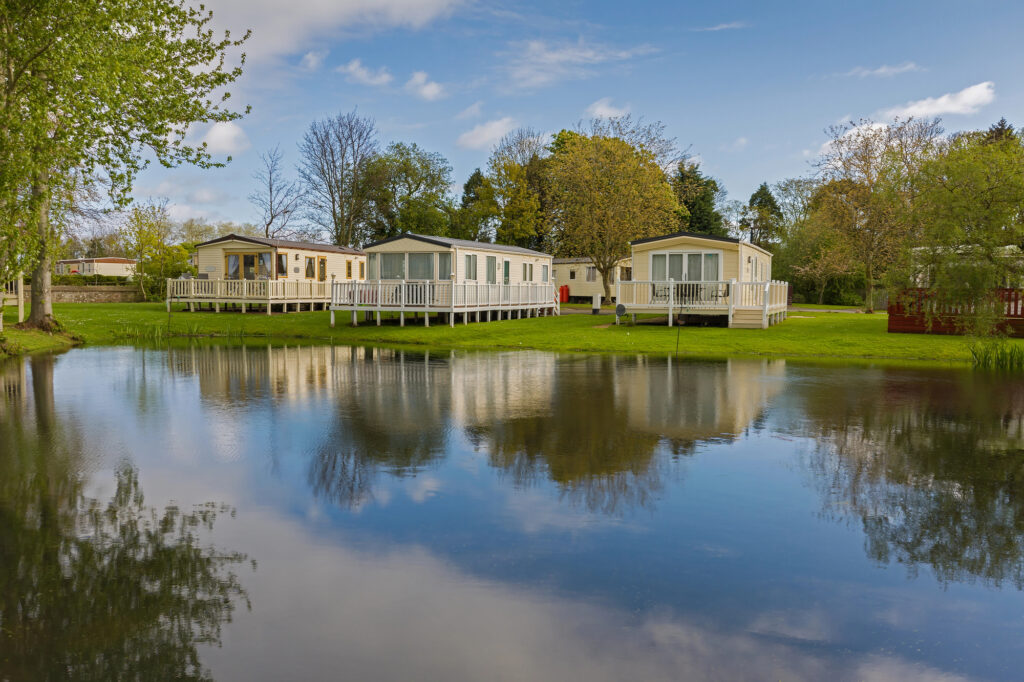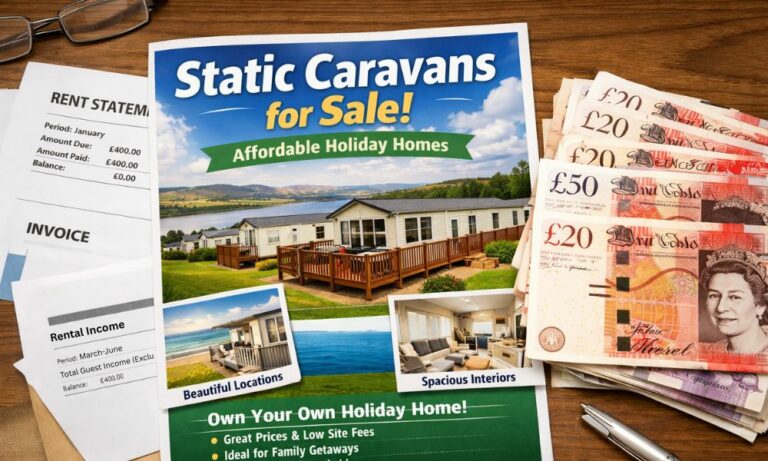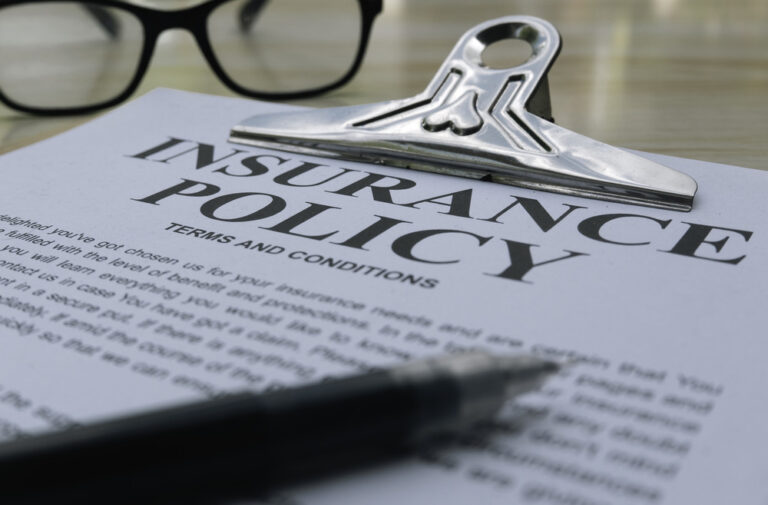Living in a static caravan is an appealing thought for millions of people – after all, who doesn’t want to save money, reduce council tax, and live a beautfiul, well-equipped home? The trouble is, while there’s plenty of info available about living in a traditional house in the UK, trustworthy info about living in a static caravan is much harder to find.
In this guide, we’ll explain everything you need to know about living in a static caravan in the UK. We’ll explore the different rules that apply to different types of parks, info about living in a static caravan on your own (or rented) land, and the costs and buying options involved.
At a glance: You can live in a static caravan in the UK. However, you can only do so legally if the caravan is either on a residential park or on private land with the correct local council permissions. You cannot legally live in a static caravan on a holiday park and should avoid any holiday parks that tell you otherwise.
Can you live in a static caravan full-time?
If you want to know if you can live in a static caravan permanently, the honest answer here is “it depends”.
The answer is different depending on the location of the caravan. As such, we’re going to add sub-sections to each answer in this guide – explaining the different rules, regulations, and costs depending on whether you’re on a residential park, a holiday park, or private land (land that you own or rent).
Let’s start with the most important question – can you live in a static caravan full-time?
Can you live in a static caravan on a holiday park?
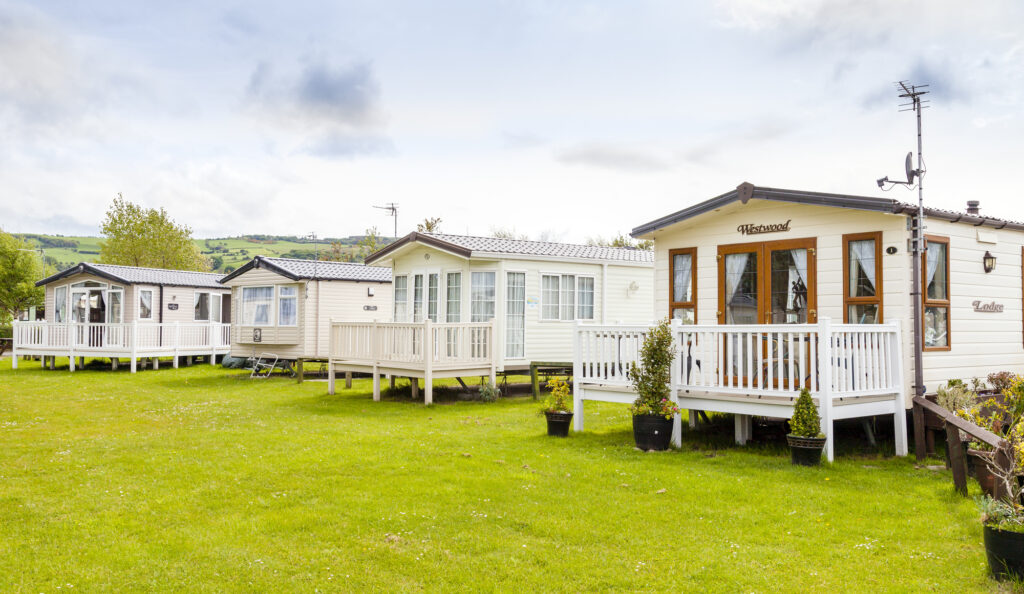
The answer here is no. Now, you might have heard differently – either from people you know or from smooth-talking salespeople on a holiday caravan site – but regardless, the answer is still no. Even if you’ve been made to feel confident that there’s a way around park or council rules to prevent “living on”, these workarounds don’t hold any weight legally, and you’re likely to find yourself in a very tricky situation at some point in the future.
The reason comes down to the kind of license that holiday park operators hold. The agreement with the local authority (usually as part of their planning permission) is that holiday homes won’t be permanently occupied. This applies even if the park has a 12-month holiday license.
If you dig into your sales or pitch fees paperwork, reputable parks will have outlined this in the legal terms and conditions you sign when you buy your static caravan. There will be an expectation that you vacate the caravan for the period that the park’s closed and don’t spend more than 60 consecutive nights in that holiday home. The latter of these conditions is to make sure people don’t live on caravan parks even if they have a licence that allows them to have guests on their park for a full 12 months.
Can you work around all this? Chances are you can in the short term, but these workarounds start to cause problems when people take a more detailed look at the park or your living situation. Perhaps the council will come and inspect the park? Maybe a new caravan park manager starts (as they frequently do) and decides to tighten up on mis-sold caravans.
There are a variety of other ways people find themselves facing problems if they try to live on holiday parks too. What’s your registered address for voting, your state pension, any benefits payments, medical services, kids’s schools, or finance agreements? Since holiday parks aren’t permanent addresses, you’ll struggle with these things – and if local authorities start to investigate people living on a holiday park, they’ll check these things too.
The short answer is – don’t risk it. Chances are, anyone who sells you a caravan to live in on a holiday park is breaking the law – but it’ll be you who suffers the consequences when the problem is discovered.
Can you live in a static caravan on a residential park?
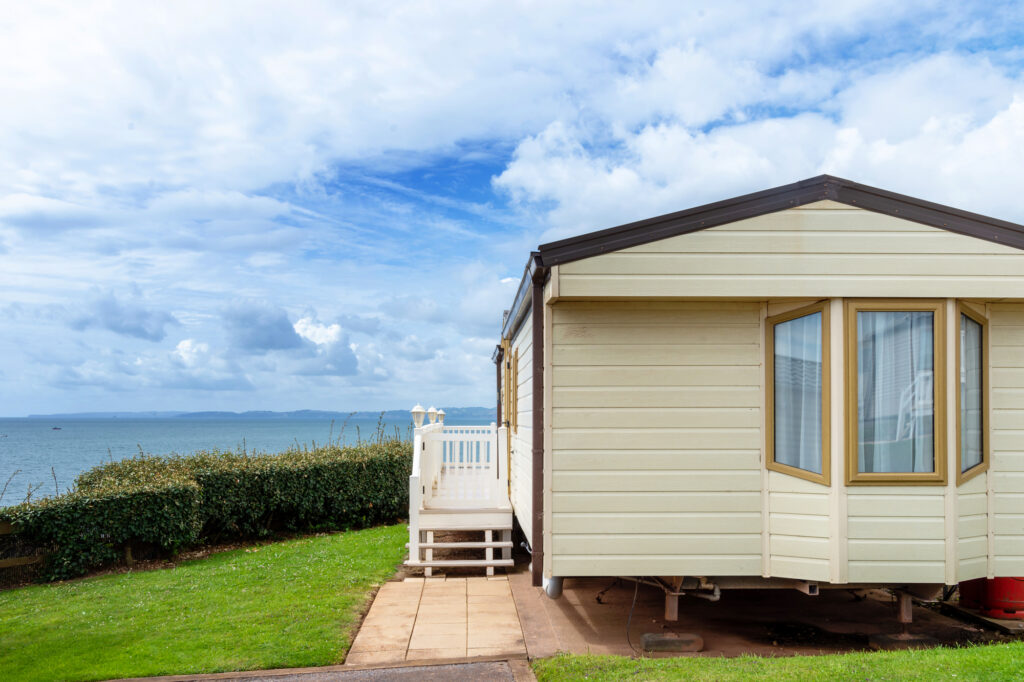
In short, yes, you can live in a static caravan on a residential park. “Residential park” means it’s set up for people who want to live on it. However, the key here is finding the right kind of park. While holiday parks are numerous and usually have availability, residential parks are less common and often don’t have as much availability.
Buying a caravan on a residential park is different to buying on a holiday park. In most cases, it’s more like dealing with an estate agent than it is a caravan salesperson. They’ll chat with you about selling your home, the timescales involved, and what you’re looking for in terms of a new location. Remember, this is going to be your permanent home, so they’ll want to make sure every fine detail is exactly right.
As with any caravan, location is important – so it’s absolutely essential that you visit prospective parks before you decide. You should also check the park’s licenses to make sure that full-time living is allowed. Chances are, the park will show you all the legal paperwork you need – if they don’t, or their answers leave you with any questions or uncertainty, there’s probably something not-quite-right happening. If this is the case, move on – and look at parks that are completely transparent about the rules and the agreements they have with the local council.
Living in a static caravan on private land
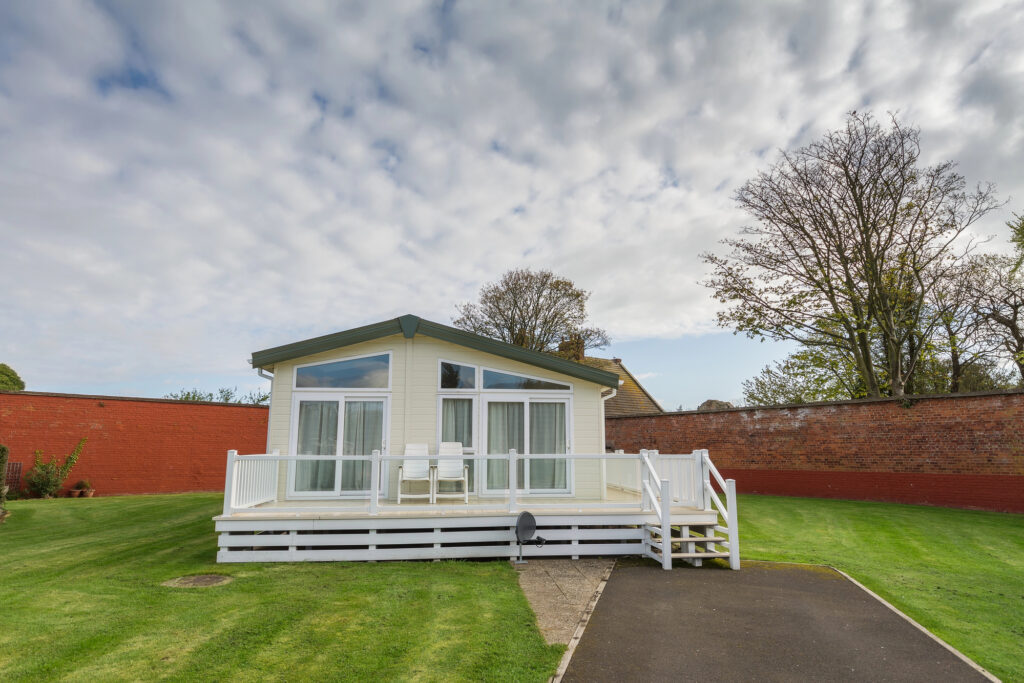
Choosing to place a static caravan on your own land or rented land can open a door to a lifestyle full of freedom and flexibility, but it comes with its own set of regulations and considerations. Whether you own the land or are thinking of renting space, understanding the legal framework is essential to ensure your static home dream doesn’t turn into a regulatory nightmare.
If you own private land and want to place a caravan on it, the first step is to check with your local planning authority. Permission is required because living in a caravan on private land is considered a change of use for the land itself. This involves submitting a planning application that details your intentions, including how the caravan will impact the environment and local infrastructure. Success hinges on factors like the land’s location, size, and how the caravan fits within local planning policies.
For those renting land, the landowner must secure planning permission. As a tenant, it’s wise to ensure this permission is in place before moving your static caravan onto the land. Without it, you could be forced to leave if the local authority takes action against the landowner.
Another critical aspect is the caravan’s use. If the caravan is an addition to an existing brick-and-mortar home, for example, providing extra living space, it might not need planning permission. However, if it’s your primary residence, planning permission is a must.
Utilities and access are also important. Connecting to electricity, water, and sewage systems involves further regulations and possibly more planning permissions. Additionally, the land must have proper access for a caravan, which might require permission if modifications to existing roads or pathways are needed.
In essence, living in a static caravan on private land can offer unparalleled independence, but it’s governed by a complex web of planning permissions and regulations. It’s crucial to conduct thorough research and possibly consult a planning professional. This preparation can help navigate the intricate process, ensuring your static caravan life is both legal and enjoyable.
Do you have to pay council tax if you live in a static caravan?
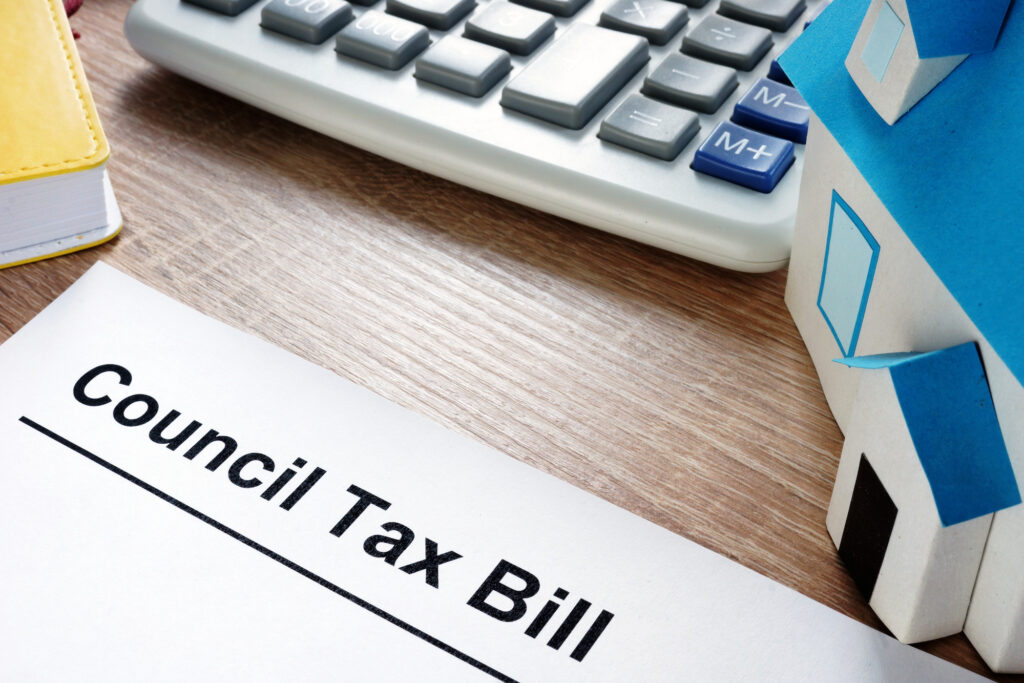
Like elsewhere in this guide, the answers to questions about rules on council tax and static caravans depend on where the caravan is sited.
Let’s take a look at each scenario individually.
Council tax and static caravans on holiday parks
If you’re staying in a static caravan on a holiday park, typically, you won’t be liable to pay council tax because these sites are not considered your main residence. Instead, the park owner is responsible for business rates, which cover the entire park, including its facilities and any holiday homes situated there.
However, as we’ve stated before, it’s crucial to remember that holiday parks are intended for temporary stays rather than permanent living, and as such, you should not be using a caravan on a holiday park as your sole or main residence under the terms of most park agreements.
Council tax and static caravans on residential parks
When living in a static caravan on a residential park, you will be required to pay council tax, as these parks are designated for permanent residence. Each static caravan or plot will be banded for council tax purposes, similar to traditional brick-and-mortar houses, although the band is often lower than for traditional houses due to the nature of caravan living.
The exact amount of council tax payable will usually vary depending on the local authority and the specific banding of your caravan.
Council tax for static caravans on private land
If you live in a static caravan on private land as your main residence, and you have the necessary planning permissions, you may be liable to pay council tax. The caravan will need to be assessed by the local council, which will assign it to a council tax band based on its value and other criteria.
As with residential parks, the band is likely to be on the lower end. However, if the caravan is used only occasionally and is not considered your main home, you might not be liable for council tax, but the primary property on the land will still be subject to council tax.
Pros and cons of living in a static caravan
Living in a static caravan offers a range of attractive advantages – many of which are the basis of daydreams for prospective buyers! That said, there are downsides to consider too – which, while not the stuff of daydreams, are important things to think about if you’re changing your living situation.
Let’s take a look at some of the pros and cons you might not hear about elsewhere.
Advantages of living in a static caravan
- Affordability: Generally, purchasing a static caravan is less expensive than buying a traditional house. Additionally, the ongoing costs for maintenance, utilities, and council tax can be lower, making it a cost-effective living option.
- Simplicity and minimalism: Living in a static caravan encourages a simpler, more minimalist lifestyle. With less space than a traditional home, you’re likely to amass fewer possessions, leading to a potentially less cluttered and more organised living environment.
- Community spirit: Many residential parks offer a strong sense of community. Neighbours are often close, and parks may provide communal areas and organise social events – all helping to create friendships and support networks.
- Flexibility and mobility: While static caravans are not as mobile as touring caravans, they can still be relocated to different sites if needed, offering a degree of flexibility that’s obviously not available to traditional homes.
- Location, location, location: Static caravan parks are usually located in picturesque settings – usually in the countryside or on the outskirts of urban areas. This potentially gives an escape from more city or town-based living without the cost of countryside property.
Disadvantages of living in a static caravan
- Space limitations: Static caravans offer less living space than most conventional homes, which can be challenging for larger families or if you’re used to having more room.
- Depreciation: Unlike traditional brick-and-mortar homes, which can appreciate over time, static caravans typically depreciate, potentially making them a less viable long-term financial investment.
- Weather vulnerability: Caravans can be less robust than traditional houses, making them more susceptible to damage from severe weather conditions, such as strong winds or heavy snowfall.
- Planning permission and legalities: Navigating the legalities of where you can place a static caravan and live in it full-time can be complex and restrictive, with planning permission often required for permanent residency on private land.
- Limited services and amenities: Depending on the location, you might find that you have limited access to services and amenities like shops, healthcare facilities, and schools, particularly in more remote caravan parks.
Living in a static caravan in winter
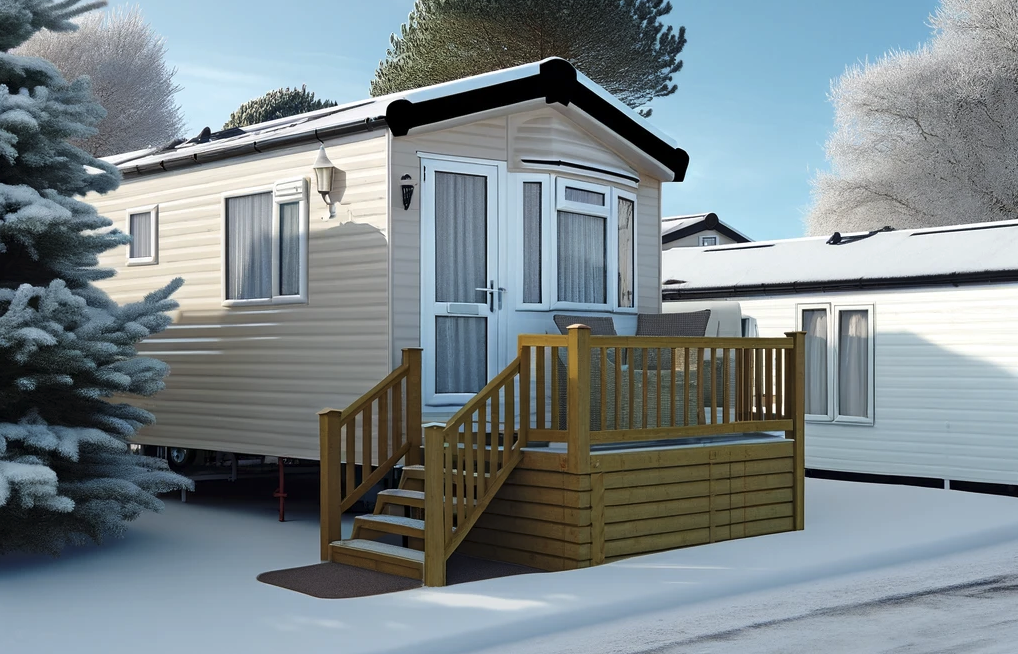
If you’re considering living in a static caravan permanently, winter is the season you need to think about most carefully when it comes to making a decision. Typically, caravans don’t have the same kind of protection from the elements you have in a brick-built home – but that doesn’t mean you’re going to have to pull a bobble hat on when you get into bed.
Double-glazing and central heating
Some caravans are designed for all-year-round use, but many aren’t. If you’re thinking about living in a static caravan, features like double-glazing and gas-powered central heating are must-haves. Single-glazed caravans with a gas or electric fire as the only source of heat are fine for summer holidays on holiday parks – but they become very cold in the winter.
A caravan that features double-glazing and central heating will also benefit from more robust insulation too – which is handy when it comes to keeping heating costs down, as well as staying warm.
Pipework cladding
Static caravans are connected to water feeds and wastewater disposal services with a series of pipes that live under the van. Even if your park allows you to put some kind of skirting around your caravan, these pipes are still going to be exposed to the cold in winter – which can lead to plumbing problems.
The problem is around what happens to water when it freezes. It expands as it becomes solid – which can lead to pipes cracking. While pipes cracking isn’t the end of the world, it is an inconvenience – and it does become more serious (and costly) if the water in the pipes freezes and causes problems inside your van. Most caravans that are suitable for living in have domestic boilers – and they’re expensive to replace if they’re damaged by the cold.
As such, it’s important to lag any external pipework. It’s the kind of job you can do if you’re proficient with DIY – or you can outsource to a plumber for a reasonable price. If you want to really make sure there are no problems, there are companies who’ll insulate the entire bottom of a caravan too – including the exposed pipework.
Ventilation
Good ventilation is a must in a static caravan. Keeping vents open and extractor fans running is a smart move in winter – especially if you caravan is prone to condensation. Even modern double-glazed and heated vans can still generate condensation, and it can quickly turn to mould if it goes unchecked.
Make sure you’ve got fuel
It might sound obvious to make sure make sure you’ve got fuel for your heating system – but most caravan owners have been caught out at some stage! When you’re on a residential park (or having a winter holiday on a holiday park) the site will likely offer a gas-bottle service – but if you’re living in a static on your own land, you might be waiting for a while for your next delivery.
It’s a good idea to have two bottles connected to your van at any one time. If your van doesn’t already have one, you can get a valve fitted that allows you to switch from one bottle to the other with just a turn of a handle – meaning your gas flow isn’t interrupted for more than a few minutes.
Of course, it’s possible to connect a caravan to a mains gas supply – and some residential parks will have gas plumbed directly to your van. However, this is a costly option if that caravan is on your own land – so keeping stocked up on bottles is a good plan.
Buying a static caravan to live in
By now, you’ve read about the rules and regulations around living in a static caravan permanently – and you’ll hopefully know one or two practical factors around living in a static – so, it’s time to find your dream caravan!
Again, the ins and outs of buying a static caravan to live in will be a little different depending on whether you’re buying for private land or buying with a view to living on a residential park, so we’ll look at both:
Buying a static caravan to live in on a residential park
Although it depends on the park operator, residential parks will often have static caravan park homes sited on their park ready to buy – or they’ll have a stock of homes that are ready to put on pitches.
In some rare cases, park operators will instead connect you with park home manufacturers so you can choose and spec your own caravan, then have it delivered to the park. This is more rare simply because it usually makes financial sense for the park owner to buy static caravans then mark them up for sale on the park. That might sound unfair – but it’s important to remember that park owners won’t sell lots of park homes, and the profit they make is an important part of making their park a fantastic place for you to live.
So, a sensible first step is looking at some parks then talking to the operators about how they do things. When you do, they’ll be able to talk you through everything you need to know – including static caravans they have available, the costs of keeping your static caravan there, the rules and regulations on the park, finance options for buying the caravan, and much more.
Buying a static caravan to live in on privately owned land
If you’re buying a static to put on your own land, you’re cutting out the middleman – there’s no park operator to consider. As such, you can generally start looking at static caravans that are for sale.
You’ve got a few options here.
The first, and easiest, involves talking to manufacturers and caravan traders about suitable caravans they have in stock. They’ll explain what they can offer, they’ll let you know about transportation costs, and they may even be able to help you with “siting” the caravan – i.e. getting it in the position you want and connecting it to services.
Secondly, you can look at preowned sited caravans that people are selling. You’ll have no problem finding these – but it’s useful to remember that the costs you see will usually reflect the fact they’re on a park, so the top-line price may include a portion of the year’s site fees, admin costs, safety checks, and so on. Removing a caravan from a park usually involves some cost – it’s a big job – so you might also find that increases what comes out of your pocket.
Of course, putting a static caravan on private land will almost certainly require planning permission – so it’s essential that you look into this prior to making any financial commitments.
FAQs: Living in a static caravan in the UK
Although we’ve tried to cover everything there is to know about living in a static caravan in the UK in this guide, we realise people often still have unanswered questions.
Here, we’ve tried to answer some of those additional questions:
Where can I put a static caravan to live in?
If you want to live in a static caravan, it will need to be either on a residential caravan park or on private land that you either own or rent. If you plan to put a static on private land, you’ll need to make sure the land has the right planning permission for a caravan.
Where can I live in a static caravan?
You can live in a static caravan on either private land with the correct planning permission or on a holiday park that has a residential license. You can’t live in a static caravan on a holiday park and you could face being kicked off the park if you do.
Where can I live permanently in a static caravan?
If you want to live in a caravan permanently, you’ll need to find a park that has residential status. If not, you’ll struggle with lots of factors – including being registered on the voters roll, having post delivered, and finding local doctors and dentists. With the right planning permission, you can also live in a static caravan on private land.
How much does it cost to live in a static caravan UK?
Like living in a house, the cost of living in a static caravan in the UK depends on a huge range of factors. The most significant cost will be the ground rent cost for keeping your caravan on a residential park. Beyond that, you should talk to the park about additional costs – such as energy costs, insurance, council tax or council rates, and water bills.
What caravan parks can you live on?
If you want to live on a caravan park, you should look for one that has ‘residential’ status. Although people may tell you differently, you cannot live on a park that’s considered a “holiday” park and if you try, you could find yourself in legal difficulty.
Where can I put a static caravan UK?
You’ve got lots of options! To use as a temporary holiday home, a static caravan can be on a holiday park or even on a piece of land you own. However, if you want to live in the static all year round, you’ll need to make sure it’s on a residential park or private land with the correct planning permission.
Why can’t you live in a static caravan all year?
You can’t live in a static caravan on a holiday park all year round because of the business licenses held by the park operator. If your park is considered a holiday park, the local authority will require them to have rules in place that say you have to vacate your caravan after a certain amount of time.
How many months can you live in a holiday home?
It depends on the park you choose. If you’re on a holiday park, you can stay (but not live) in your caravan, usually for up to 60 days at a time. Of course, the season length will dictate the number of months you can stay too – with many parks closing during the winter. On the other hand, people who buy caravans on residential parks can live in them all year round, thanks to the residential license held by the park.
Summary: Can you live in a static caravan all year round?
Living in a static caravan in the UK is perfectly possible – either on a residential park or on privately owned land. Even if you’ve been told otherwise, buying a static caravan on holiday park with a view to living there full time is not a good idea and you shouldn’t do it – the park would likely be breaking the law by allowing you to do so, and you could be homeless if the authorities or park operator become aware.
If you do decide to live in a static caravan, you’ll be expected to pay council tax – although it will usually be cheaper than a traditional house. Overall, the running costs are also likely to be cheaper – but there are other pros and cons to consider.
When it comes to next steps around buying a static caravan to live in, it’s a good idea to start by looking at suitable parks and understanding what your options are. That said, if you’re planning on buying a static to place on land you own or rent, you can move straight to looking at suitable caravans – but always make sure you’ve got planning permission agreements in place before you buy.
